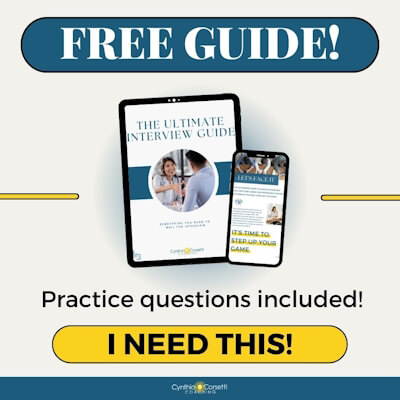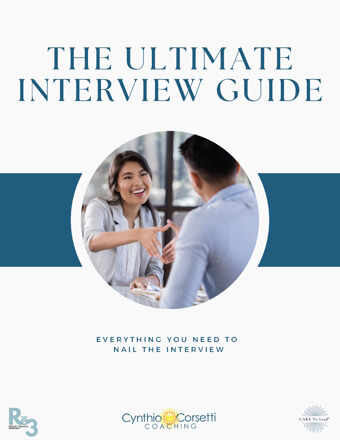Why should you consider memorizing interview stories to tell for when you land your dream job interview?
Interviewing for a new position is stressful under the best of circumstances. When you add in things like global pandemics and having to do everything online, it’s even worse.
There’s this awkward feeling you get sitting at your own kitchen table. Dressed in your best interview outfit, trying to look professional. Your kids are playing with Legos in the next room. It’s enough to make anyone crazy.
The interview starts off great. The people seem warm and you feel instant rapport. You begin to feel a little sense of relief as you breeze through the questions about your resume.
And then it happens. They ask you a question that should be simple to answer and you choke. Or they ask a behavioral interview question that requires you to expand on a moment from your work history. You stare at them with wide eyes.
You’re staring at your computer screen with sweat beading down your forehead. Your heart is racing and the interviewer is waiting for an answer.
Your mind is blank. The harder you try to think of an answer, the faster your heart beats. You’re sure they can hear it through the computer.
Then you try to answer, and it feels like an out- of-body experience. There are words coming out of your mouth, and you feel like a spectator. The words are making no sense, and they aren’t answering the question.
You laugh a nervous laugh…
And before you know it, the interview is over and you’ve blown any chance at getting called back.
Framing interview stories to tell in your next interview
The stakes are higher today than they’ve ever been. Unemployment is at an all-time high and employers are hesitant to hire. The average position receives about 250 resumes (pre-pandemic numbers). And only 5 – 7 of those land an interview.
It’s not the time to blow it. And yet… you did. Don’t beat yourself up. It happens to the best of us. Even those of us who interview for a living can get tripped up when the shoe is on the other foot.
That’s why preparation is paramount. I always suggest to my clients that they prepare and memorize five STAR format stories.
The STAR format means each story should include:
Situation – a brief description of the circumstance you were in.
Task – a specific outcome you were trying to achieve.
Action – a laundry list of actions you took to achieve the goal
Result – the final outcome.
This format is both simple and complex but with preparation you can nail it.
First, look at the job posting to see exactly what the employer is looking for. Often the biggest need will be in the first line or two of the posting.
Finding good interview stories
Here’s how to use a Job Post to to find good interview stories when crafting your answers:
This is an excerpt from a recent job post:
As a Senior IT Consultant / IT Project Manager, you will provide project planning expertise to deliver critical client initiatives. You will serve as trusted business advisor to our clients while leading a variety of business-related projects.
You will be expected to be a hands-on leader, facilitating project meetings, tracking project activities, and communicating milestones to leadership and key stakeholders, while ensuring that the project runs seamlessly from start to finish.
That tells me that the person who will get this job will have solid IT experience and solid Project Management experience. That means that one of the STAR stories will showcase your ability to manage IT projects.
And when you read the second paragraph, it says the same thing. They want someone to see that projects run seamlessly from start to finish.
My guess is that they’ve been struggling with getting projects out on time. After all, they said the same thing twice in their post. This is important to them. The description also talks about communication with stakeholders. These are direct clues to what they want in a candidate.
If you’re going to memorize five stories, make sure that each one of them has some example of how you do these things.
Other things your five stories should cover
Here are some other things your five power stories for interviews should cover:
Good interviewers use behavioral interview questions. They know that the best way to determine how someone will perform on the job is to know how they’ve performed in the past.
These five interview stories to tell will be your way of getting the employer to know you. You want them to see, not only how you performed in the past, but how you did exactly what they are looking for.
You will want your five stories to showcase the things in their post. And you’ll want to have stories that show that you work well with others. No one wants to hire a candidate that doesn’t fit the mojo.
One of your stories should show how you’ve helped develop another person if you supervised. Or, depending on your level, how you learned a new role.
Every employer wants to know that you have the skills to do the job and the personality to work well with others. They’ll also want to know that you have a solid work ethic and you’re not a complainer.
If you have stories that demonstrate each of these qualities, they will learn this about you. Even if they don’t ask that exact question.
You’ll want to memorize your stories and know them very well. That way you can answer almost any question asked of you using some part of one of them. With practice you can do this seamlessly.
These five stories will give you confidence. You won’t get tripped up in an interview. Every time they ask a question you can think to yourself… hmm… which one can I use for that question?
The confidence will help you in every aspect of the interview. Even if they ask something that you don’t expect, you’ll have a framework of how to answer.
What to do next?
The fact is interview preparation is likely one of the highest ROI items you can do for your career. And don’t think you don’t have to prepare because you like to talk to people. Everyone needs to prepare. Even you. Even me.
Go out there and knock it out of the park! You’ve got this!
If you need support to help you master your next interview, let’s chat about the Interview Mastery program. Don’t take a chance with your biggest opportunity. Ensure you nail the interview.

Cynthia Corsetti is an Executive and Career Coach. Whether you’re looking for a career transition or to make a bigger impact in your current career, Cynthia is the partner you’re looking for. Follow her on Facebook, LinkedIn, and YouTube.











0 Comments